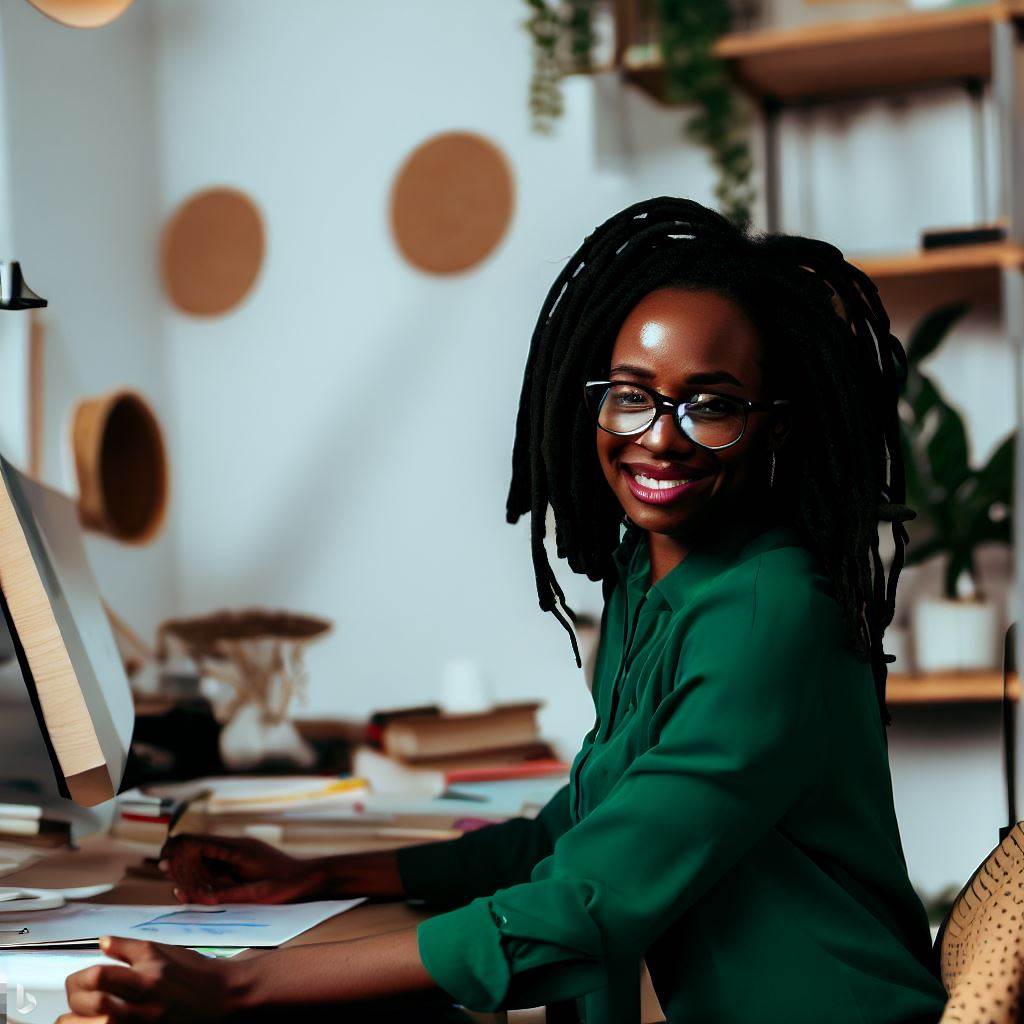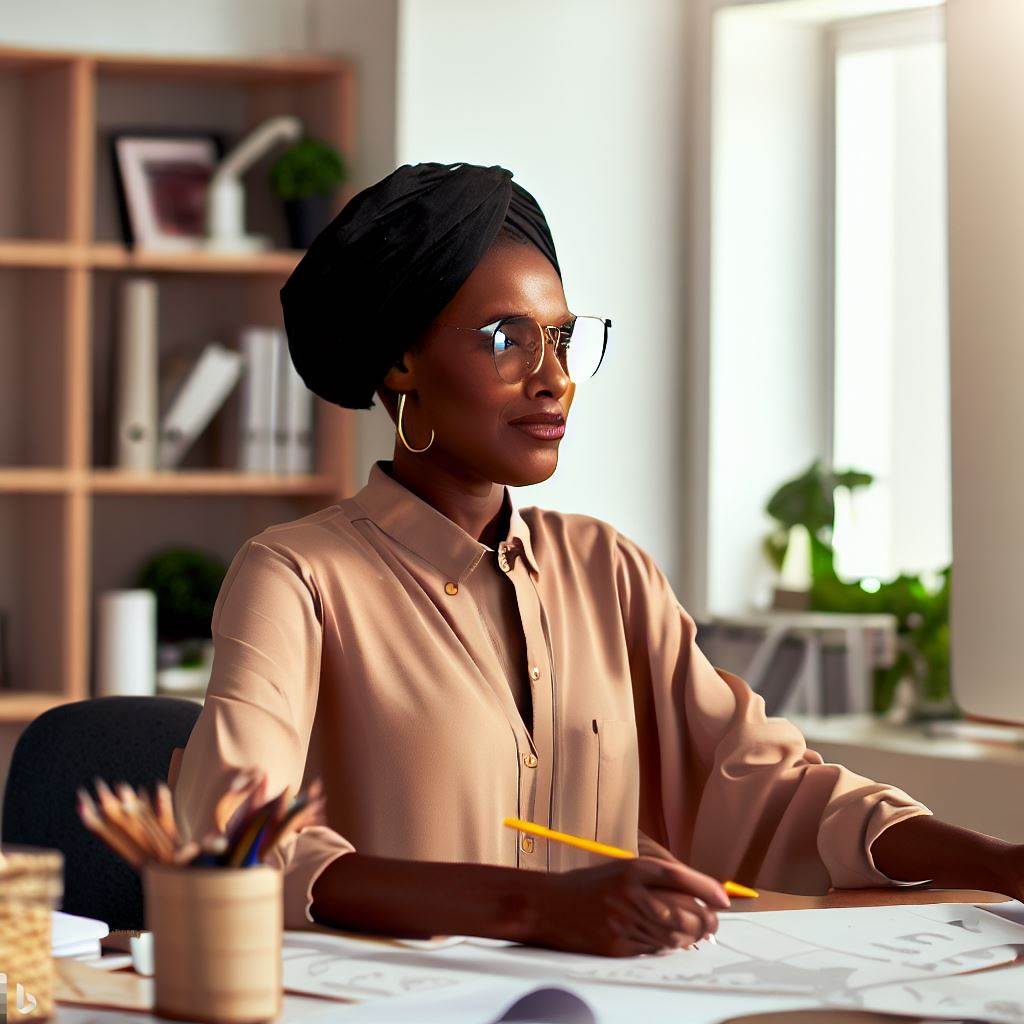Introduction
Interior design trends refer to popular styles and concepts used in decorating spaces.
Interior design trends are ever-evolving, and in Nigeria, staying current with these trends is crucial for creating stylish and functional spaces.
In this blog post, we will explore the hottest interior design trends of 2023 that are making waves in Nigeria.
- Sustainable Design: As environmental consciousness grows, Nigerians are embracing sustainable interior design. Recycled materials, energy-efficient lighting, and eco-friendly furnishings are gaining popularity.
- Biophilic Design: Bringing nature indoors is a major trend. Incorporating plants, natural materials, and large windows for better connectivity with the outdoors are all the rage.
- Bold Colors: Vibrant and bold color palettes are replacing neutral tones. Nigerians are becoming more adventurous with their interior color choices, from deep blues to rich reds.
- Minimalism: Simple, clutter-free spaces are gaining traction. Nigerians are opting for minimalist designs that emphasize functionality and clean lines.
- Artisanal and Handcrafted Elements: Locally crafted furniture and decor items are in demand. Nigerians are embracing traditional craftsmanship in their interior design.
- Smart Homes: With the rise of technology, smart homes are becoming more accessible. Home automation systems for lighting, security, and climate control are becoming commonplace.
- Texture Play: Mixing textures like stone, wood, and metal adds depth and character to interiors. Nigerians are experimenting with different textures for a more tactile experience.
- Vintage Revival: Antique and vintage pieces are making a comeback. Nigerians are incorporating these timeless pieces into their modern interiors for a touch of nostalgia.
- Open Shelving: Open shelves are replacing traditional cabinets in kitchens and bathrooms, showcasing stylish dinnerware and toiletries.
- Global Influences: Nigerian interior designers are drawing inspiration from various cultures, incorporating elements from around the world into their designs.
In review, staying informed about the latest interior design trends is essential for creating captivating and functional spaces in Nigeria. Whether you’re a homeowner or a professional designer, embracing these trends can help you transform your interiors into stunning and on-trend spaces in 2023.
Overview of Nigeria’s Interior Design
Historical background of Nigerian interior design
Nigeria’s interior design scene has evolved significantly over the years, reflecting the country’s rich history and diverse cultures.
From traditional African aesthetics to modern influences, Nigerian interior design is a melting pot of styles and inspiration.
Throughout history, Nigerian interior design has been heavily influenced by the various ethnic groups and regions within the country.
Each group brings its unique design traditions and artistry, resulting in a vibrant and dynamic mix of styles.
One important aspect of Nigerian interior design is the use of traditional materials and craftsmanship.
Craftsmen utilize local resources like wood, woven textiles, and natural fibers to create intricate and beautiful pieces of furniture and decor.
Traditional Nigerian interior design is characterized by bold colors, intricate patterns, and ornate details.
Reflecting the culture’s vibrancy, spaces are often adorned with vibrant textiles, hand-painted ceramics, and intricately carved wooden furniture.
In recent years, there has been a growing trend towards blending traditional Nigerian elements with contemporary design.
This fusion creates a unique and modern aesthetic that still pays homage to the country’s cultural heritage.
Another essential aspect of Nigerian interior design is the incorporation of cultural symbols and motifs.
From adire motifs in Yoruba design to Nsibidi symbols in Igbo design, these elements add depth and meaning to the overall aesthetic of the space.
Influences from different regions and cultures within Nigeria
Nigeria is a culturally diverse country with over 250 ethnic groups, each contributing to the overall tapestry of Nigerian interior design.
Different regions and cultures within Nigeria have their distinct design styles and influences.
In the northern region of Nigeria, Hausa and Fulani influences can be seen in interior design.
Traditional Fulani homes, for example, often feature vibrant textiles, intricate embroidery, and leather furnishings.
Igbo architecture often incorporates natural materials like mud and thatch, resulting in earthy, organic interiors.
Igbo design also incorporates symbolic elements such as carved wooden door frames and woven mats.
Western Nigeria, particularly the Yoruba culture, is known for its rich aesthetics.
Adire textiles, which are indigo-dyed fabrics with intricate patterns created using resist dyeing techniques, are a prominent feature in Yoruba homes.
Yoruba design also showcases bold colors and geometric patterns. The Niger Delta region, with its diverse ethnic groups, showcases a mix of influences.
The Ijaw people, for example, often incorporate marine motifs into their interior design, reflecting their close relationship with the river and sea.
Basically, Nigeria’s interior design scene is a fascinating blend of traditional African aesthetics and contemporary influences.
The historical background and diverse cultures within Nigeria contribute to the development of unique and vibrant design styles.
Whether it’s the bold colors of Yoruba design or the intricate craftsmanship of Igbo design, Nigerian interior design continues to evolve and inspire.
Read: Software Tools for Interior Designers in Nigeria: A Review
Current Interior Design Trends in Nigeria
Use of vibrant colors and patterns
In recent years, Nigerian interior design has seen a surge in the use of vibrant colors and patterns.
This trend is all about creating bold and lively spaces that reflect the country’s vibrant culture and spirit.
From bright reds and oranges to rich blues and greens, Nigerians are not afraid to embrace color in their homes.
One popular way to incorporate vibrant colors is through accent walls.
Instead of painting an entire room in a vibrant shade, Nigerians are opting for one wall that serves as a focal point. This allows for a pop of color without overwhelming the space.
In addition to colors, patterns also play a significant role in Nigerian interior design.
Traditional Nigerian fabrics such as Ankara and Adire are being used to create unique and eye-catching patterns on upholstery, curtains, and even wallpapers.
These patterns add a touch of cultural heritage and uniqueness to the space.
Incorporation of traditional Nigerian art and crafts
Another prevailing trend in Nigerian interior design is the incorporation of traditional Nigerian art and crafts.
Nigerians are proud of their cultural heritage, and they are finding ways to showcase it within their living spaces.
Traditional Nigerian art, such as wall masks, sculptures, and paintings, are being used as statement pieces in homes.
These art pieces not only add beauty but also tell a story and provide a connection to Nigeria’s rich history.
Nigerian crafts are also being used in interior design to add a touch of authenticity and craftsmanship.
Handwoven baskets, pottery, and beaded accessories are being used as decorative elements, giving spaces a unique and personalized touch.
Embracing natural elements and eco-friendly materials
With a growing global focus on sustainability, Nigerians are also embracing natural elements and eco-friendly materials in their interior design choices.
This trend is not only about being environmentally conscious but also about creating a harmonious connection with nature.
Materials such as bamboo, rattan, and cork are being used for furniture and accessories. These materials not only add a natural and organic feel but are also renewable resources.
Indoor plants have also become an integral part of Nigerian interior design. From small succulents to larger potted plants, Nigerians are bringing nature indoors to create a calming and serene atmosphere.
Plants not only enhance air quality but also add a touch of life to any space.
Integration of technology in interior design
Lastly, the integration of technology in interior design is a trend that is gaining popularity in Nigeria.
As the country embraces modernity, technology has become an essential component of interior design.
Smart home systems that control lighting, temperature, and security are becoming more accessible to Nigerians.
Additionally, gadgets such as voice-controlled speakers, automated curtains, and wireless charging stations are being incorporated into homes, making everyday life more convenient and efficient.
Generally, Nigeria’s interior design trends in 2023 are characterized by the use of vibrant colors and patterns, incorporation of traditional Nigerian art and crafts, embracing natural elements and eco-friendly materials, and integration of technology.
These trends reflect both the country’s cultural heritage and its desire to embrace modernity.
By understanding and incorporating these trends, Nigerians can create beautiful and functional living spaces that truly represent their unique identity.
Read: Interior Design Regulations in Nigeria: What You Need to Know
Hot Interior Design Trends in Nigeria for 2023
Minimalist designs with clean lines
- Minimalist designs with clean lines will dominate the interior design scene in Nigeria in 2023.
- The simplicity and elegance of minimalist designs create a sense of calm and tranquility in any space.
- Minimalist interiors showcase a pared-down aesthetic, focusing on essential elements and decluttered spaces.
- Neutral color palettes, such as whites, grays, and earth tones, will be popular choices for minimalist designs.
- Furniture pieces with sleek and straight lines, devoid of unnecessary ornamentation, will be highly sought after.
- Minimalist designs promote functionality and efficiency, making them perfect for modern Nigerian homes.
- Incorporating natural materials like wood, stone, and bamboo can add warmth and texture to minimalist spaces.
- Lighting plays a crucial role in minimalist designs, with an emphasis on soft, diffused lighting to create a serene ambiance.
- Minimalist designs also embrace the concept of negative space, allowing room for relaxation and contemplation.
- Overall, minimalist designs offer a timeless and sophisticated aesthetic that will be in vogue in Nigeria in 2023.
Fusion of different styles and cultural influences
- In 2023, interior design in Nigeria will showcase a fusion of different styles and cultural influences.
- This trend reflects the diversity and multicultural nature of Nigerian society.
- Expect to see a blend of traditional Nigerian elements with contemporary and global design trends.
- Incorporating traditional Nigerian patterns, fabrics, and artwork can add a unique and personal touch to interiors.
- Mixing different furniture styles, such as contemporary and vintage pieces, will create an eclectic and vibrant look.
- Embracing cultural influences from other parts of Africa and the world will also be a key aspect of this trend.
- Designers will combine elements from different cultures to create harmonious and visually appealing spaces.
- Vibrant colors and intricate patterns inspired by Nigerian textiles will be integrated into various design elements.
- The fusion of different styles and cultural influences allows for creative expression and individuality.
- This trend celebrates diversity and creates spaces that reflect the rich heritage and global outlook of Nigerians.
Sustainable and ethical interior design practices
- As environmental consciousness grows, sustainable and ethical interior design practices will gain prominence in Nigeria.
- Designers will prioritize eco-friendly materials and products that minimize harm to the environment.
- The use of recycled and repurposed materials will also be a focus, reducing waste and promoting resourcefulness.
- Sustainable interior design practices go beyond materials and encompass energy-efficient lighting and appliances.
- Creating spaces that optimize natural ventilation and daylight will help reduce energy consumption.
- Ethical sourcing of furniture and decor items will become crucial, supporting artisans and local communities.
- Nigerian designers will collaborate with local craftsmen to promote traditional skills and sustainable livelihoods.
- Biophilic design, integrating nature into interior spaces, will play a significant role in sustainable practices.
- Incorporating indoor plants, natural materials, and views of greenery can enhance well-being and air quality.
- By adopting sustainable and ethical practices, interior design in Nigeria will contribute to a healthier planet and society.
Introduction of smart home technology for functionality and convenience
- In 2023, smart home technology will revolutionize interior design in Nigeria, enhancing functionality and convenience.
- Smart devices and systems will be seamlessly integrated into homes, allowing for control and automation.
- Lighting systems that adjust based on the time of day and personal preferences will create the perfect ambiance.
- Smart thermostats will regulate temperature, optimizing energy usage and cost savings.
- Home security systems with remote access and real-time monitoring will provide peace of mind to homeowners.
- Voice-controlled virtual assistants will enable hands-free control of various household functions.
- Motorized blinds and curtains can be operated through apps or voice commands, adding convenience and privacy.
- Smart appliances, such as refrigerators, washing machines, and coffee makers, will enhance efficiency and ease.
- Integrating home automation with sustainable practices can lead to significant energy savings.
- The introduction of smart home technology will redefine comfort and convenience in Nigerian homes in 2023.
Essentially the interior design trends in Nigeria for 2023 will showcase a combination of minimalist designs with clean lines, a fusion of different styles and cultural influences, sustainable and ethical practices, and the introduction of smart home technology.
These trends reflect the desire for simplicity, individual expression, environmental consciousness, and technological advancements in Nigerian homes.
Whether you prefer a minimalistic aesthetic, a blend of different cultures, sustainable materials, or smart functionality, 2023 will offer a range of options to create stylish and purposeful interiors in Nigeria.
Read: Collaborating with Architects: Interior Design in Nigeria

Popular Nigerian Interior Designers
Profile and Background of Influential Nigerian Interior Designers
- Tolu Oniru-Demuren: A renowned interior designer known for her elegant and contemporary designs.
- Ehi Ogbebor: Founder of Sayaveth Interiors, known for her luxurious and opulent design style.
- Olajumoke Adenowo: An architect and interior designer known for her innovative and futuristic designs.
- Banke Ajagunna: Founder of Decor By Etal, known for her minimalist and modern design approach.
- Chubi Eze: An interior designer focused on creating functional and practical spaces for clients.
Their Unique Design Styles and Projects
- Tolu Oniru-Demuren: Tolu combines traditional Nigerian elements with contemporary design to create a unique fusion.
Showcase: A living room with vibrant Ankara-inspired upholstery and modern furniture pieces. - Ehi Ogbebor: Ehi’s design style is characterized by grandeur and luxury, using rich materials and intricate detailing.
Showcase: A luxurious bedroom with a four-poster bed, velvet drapes, and gold accents. - Olajumoke Adenowo: Olajumoke’s designs are futuristic and avant-garde, incorporating cutting-edge technology.
Showcase: A smart home with automated lighting, temperature control, and voice-activated commands. - Banke Ajagunna: Banke’s design approach emphasizes simplicity and functionality, creating clean and timeless spaces.
Showcase: A minimalist kitchen with sleek cabinets, stainless steel appliances, and a marble countertop. - Chubi Eze: Chubi focuses on creating practical and efficient spaces, utilizing clever storage solutions. Showcase: A small apartment with hidden storage compartments, convertible furniture, and compact design elements.
Contributions to the Current and Future Interior Design Trends in Nigeria
- Tolu Oniru-Demuren: Tolu’s use of traditional Nigerian elements highlights the importance of cultural preservation in design.
Contribution: Inspires the integration of cultural motifs and traditional materials in contemporary Nigerian interiors. - Ehi Ogbebor: Ehi’s emphasis on luxurious design showcases the growing demand for opulent interiors in Nigeria.
Contribution: Encourages the use of rich textures, ornate detailing, and lavish finishes in high-end residential projects. - Olajumoke Adenowo: Olajumoke’s futuristic designs push the boundaries of traditional interior design concepts.
Contribution: Inspires the adoption of advanced technologies and smart home solutions in Nigerian homes. - Banke Ajagunna: Banke’s minimalist approach promotes the concept of “less is more” in interior design.
Contribution: Encourages the use of clean lines, neutral colors, and open spaces, reflecting a modern and timeless aesthetic. - Chubi Eze: Chubi’s focus on functionality emphasizes the importance of practicality in design.
Contribution: Encourages the integration of storage solutions, multipurpose furniture, and space-saving design techniques.
In general, these influential Nigerian interior designers have made significant contributions to the current and future trends in interior design.
From showcasing cultural motifs to embracing luxury and functionality, their unique styles and projects inspire and shape the Nigerian design landscape.
Read: Cultural Influences on Interior Design in Nigeria: A Study
Challenges and Opportunities in Nigerian Interior Design
Limited access to quality and affordable resources
Nigeria’s interior design industry often struggles with limited access to quality and affordable resources.
This includes materials such as furniture, fabrics, paint, and lighting fixtures. The limited availability of these resources can impact both the quality of the final design and the cost for clients.
While there are some local suppliers and manufacturers, the options can be limited and may not always meet the desired quality standards.
This forces interior designers to rely on imported goods, which can be expensive due to import taxes and shipping costs.
The scarcity of affordable resources poses a significant challenge for Nigerian interior designers.
Lack of widespread awareness and appreciation for interior design
Interior design is often overlooked or undervalued in Nigeria.
Many people perceive it as a luxury or unnecessary expense, rather than a practical and essential aspect of creating functional and aesthetically pleasing spaces.
This lack of awareness and appreciation poses a hurdle for interior designers in gaining clients and recognition for their work.
Education and awareness campaigns are necessary to change this perception and promote the benefits of good interior design.
It is crucial to emphasize how well-designed spaces can enhance productivity, improve well-being, and reflect personal style.
By raising awareness and educating the public, interior designers can foster a greater appreciation for their profession.
Potential for growth and development in the industry
Despite the challenges faced by Nigerian interior designers, there is immense potential for growth and development in the industry.
As Nigeria experiences economic growth, individuals and businesses have a growing demand for sophisticated and well-designed spaces.
The rise of the middle class and urbanization has led to an increased interest in interior design.
More people are seeking professional assistance to transform their homes, offices, hotels, and other spaces.
This demand creates opportunities for interior designers to showcase their talent and expand their client base.
Furthermore, the Nigerian government’s focus on promoting local industries and entrepreneurship presents an opportunity for interior designers to thrive.
By supporting local artisans and manufacturers, interior designers can contribute to the development of a robust and sustainable supply chain for quality resources and materials.
In essence, while the Nigerian interior design industry faces challenges such as limited access to resources and a lack of awareness, there are also significant opportunities for growth and development.
By addressing these challenges and seizing the opportunities, interior designers can contribute to the creation of stylish and functional spaces across Nigeria.
Conclusion
Recap of the current and future interior design trends in Nigeria
In this blog post, we have explored the current and future interior design trends in Nigeria.
We have seen how Nigerian designers are drawing inspiration from traditional Nigerian elements and incorporating them into modern designs.
From bold colors and patterns to sustainable materials, Nigerian interior design is evolving and becoming more innovative.
Publish Your Professional Profile, Business or Brand
Showcase your expertise, gain trust, and boost visibility instantly on Professions.ng.
Publish NowImportance of embracing and promoting Nigerian talent in the design industry
It is essential to embrace and promote Nigerian talent in the design industry.
By supporting local designers and artisans, we can contribute to the growth of the Nigerian design industry and showcase the unique creativity and craftsmanship of Nigeria.
This will not only support the local economy but also provide opportunities for the next generation of Nigerian designers.
Encouragement for readers to explore and experiment with interior design in their own spaces
Morever, we encourage readers to explore and experiment with interior design in their own spaces.
Whether it’s adding vibrant colors and patterns or incorporating traditional Nigerian elements, don’t be afraid to think outside the box and create a space that reflects your personal style.
Interior design is a powerful way to express yourself and make your living space truly unique.
In a nutshell, Nigeria’s interior design trends in 2023 are exciting and diverse.
By embracing and supporting Nigerian talent, we can contribute to the growth of the design industry while also creating beautiful and innovative spaces in our own homes.





Hello Nicolas,
I find this article very interesting, well done!
Hassan
Thank you so much, Hassan
Hello,
This is post is a watershed for me.
Thank you so much.
I truly appreciate your feedback and you’re most welcome.